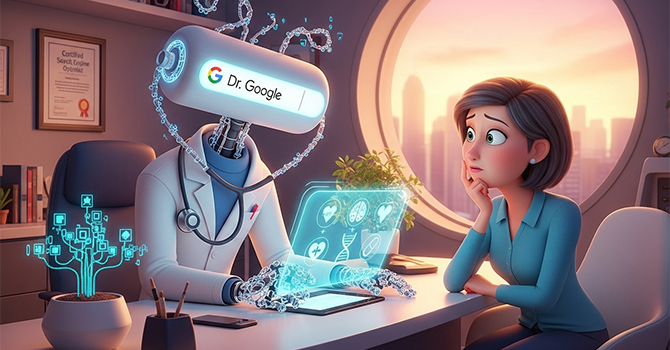Artificial intelligence is changing how we approach health care, and many people are already turning to it for medical guidance. A recent survey shows that over one in three Americans have used AI chatbots to look up health information, with nearly half of those under 35 doing so.
This growing trend is not surprising. Doctors themselves are using AI to improve diagnostic accuracy and streamline patient care. However, while chatbots can be incredibly helpful, they also come with serious risks. Without access to your full medical history, an AI tool can easily miss important context or generate misleading information, sometimes even creating confident but completely false “hallucinations.”
Still, when used thoughtfully, AI can be a valuable ally in managing your health. Here’s how to make the most of it and when to use caution.
How to Use AI for Better Health Care
- Use AI to Understand, Not Diagnose
AI is best used to understand your health better, not to diagnose yourself. After a doctor’s appointment, patients can use chatbots to explain medical terms, clarify complex diagnoses, or expand on what was discussed during the visit. It’s actually a good idea to put your last doctor’s note in and ask AI further questions.
AI chatbots are great at simplifying information. They can be especially useful for people dealing with rare diseases or complex conditions like cancer or dementia, helping them explore treatment options, disease progression, and new therapies.
- Prepare Smarter for Doctor Visits
AI can also help you prepare for medical appointments. You can use it to list questions, summarize symptoms, and practice concise explanations to make sure that limited consultation time is used effectively. Those referred to specialists can even ask chatbots what to expect during the visit or which tests might be performed.
- Be Careful with Self-Diagnosis
Using AI as a “second opinion” can sometimes be helpful. AI can occasionally spot conditions doctors may have missed. Unlike traditional search engines, chatbots tailor responses to your specific symptoms and context.
However, experts warn against relying on AI for urgent or life-threatening symptoms such as chest pain or stroke signs. Always seek immediate medical help in those cases.
- Protect Your Privacy and Cross-Check Information
Avoid sharing personal details like names, addresses, or full medical records with chatbots. It is unclear how companies store or use such data. To ensure accuracy, compare answers from different AI models like ChatGPT, Gemini, Claude, or Perplexity. If the responses differ, that is a sign to verify the information.
The Bottom Line
AI tools are evolving fast, and one day they might help monitor patients or create personalized treatment plans. But for now, they should complement doctors, not replace them. The best care still comes from the partnership between human expertise and smart technology, not from a chatbot acting as your doctor.
- The New Dr. Google is in: Here’s How to Use it Wisely - October 15, 2025
- Leadership in the AI Era: 5 Skills That Drive Real Impact - October 8, 2025
- Amazon’s Agentic AI: Transforming the Seller Experience - September 18, 2025




